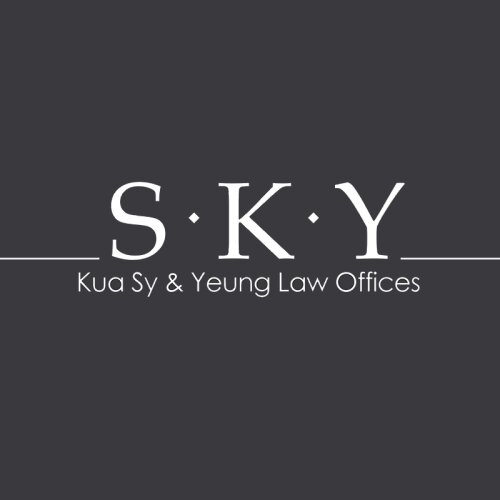Best Nonprofit & Charitable Organizations Lawyers in Pasig
Share your needs with us, get contacted by law firms.
Free. Takes 2 min.
List of the best lawyers in Pasig, Philippines
About Nonprofit & Charitable Organizations Law in Pasig, Philippines
Nonprofit and charitable organizations in Pasig, Philippines play a crucial role in contributing to societal welfare by addressing various social, cultural, educational, and environmental issues. These organizations operate under a framework that allows them to pursue their objectives without the motive of profit distribution to shareholders. In Pasig, these entities are governed by a combination of national and local laws and regulations, ensuring accountability, transparency, and proper management of resources. Understanding the legal landscape is critical for operating effectively and legally within the city.
Why You May Need a Lawyer
Engaging a lawyer can be invaluable for nonprofit and charitable organizations in numerous scenarios. A lawyer can assist in forming a legal entity, ensuring compliance with regulatory requirements, and navigating tax exemptions. Additionally, legal advice is crucial when drafting bylaws, managing governance issues, handling employment or volunteer disputes, and ensuring donor compliance. Lawyers can also provide guidance on maintaining proper financial records and facilitate the resolution of disputes both internally and with external entities.
Local Laws Overview
The legal framework for nonprofit and charitable organizations in Pasig is primarily guided by national legislation, such as the Corporation Code of the Philippines and the Bureau of Internal Revenue regulations regarding tax exemptions. Additionally, the Securities and Exchange Commission (SEC) oversees the registration and compliance of these organizations. Locally, the city of Pasig may impose additional requirements concerning operational permits and other regulations tailored to specific activities. Staying informed about both national and local legal requirements is essential for organizational compliance and success.
Frequently Asked Questions
What is required to establish a nonprofit organization in Pasig?
To establish a nonprofit organization, you must register with the Securities and Exchange Commission (SEC) and comply with its requirements, including drafting articles of incorporation and bylaws. Moreover, securing a tax identification number (TIN) and applicable permits from the local government is essential.
Are nonprofit organizations in Pasig eligible for tax exemptions?
Yes, nonprofit organizations can apply for tax-exempt status under specific conditions outlined by the Bureau of Internal Revenue (BIR). The organization must pursue activities that qualify under the tax code, and proper documentation needs to be submitted and approved.
What are the compliance requirements for a registered nonprofit?
Registered nonprofits must comply with annual reporting to the SEC, including financial statements and general information sheets. They also need to maintain proper records of their financial activities and renew local permits as required.
Can a nonprofit organization engage in income-generating activities?
Yes, as long as the income generated is used to support the organization's nonprofit activities. However, these activities must be reported, and the organization should ensure they remain compliant with tax laws regarding unrelated business income.
How can I ensure the legality of donations received by our organization?
Ensure that your organization issues official receipts for donations and maintains transparency in fund usage. Clear and accurate financial records should be kept, and acknowledgement should comply with BIR regulations on donor tax exemptions.
What steps can be taken if there's a governance issue within a nonprofit?
Addressing governance issues starts with consulting the bylaws for conflict resolution procedures. Engaging a lawyer can provide further assistance in resolving disputes, possibly through mediation or arbitration.
Is it necessary to have a lawyer when forming a nonprofit?
While not legally required, having a lawyer is advisable as they can provide essential guidance on the legal complexities of formation, compliance, and governance, ensuring your organization is set on a strong legal foundation.
What legal pitfalls should nonprofits in Pasig avoid?
Common legal pitfalls include failure to comply with registration and reporting requirements, misuse of funds, inadequate record keeping, and lack of transparency in management and operations.
Are there penalties for non-compliance with NGO laws in Pasig?
Yes, non-compliance can result in penalties such as fines, revocation of tax exemptions, or in severe cases, dissolution of the entity. It is crucial to adhere strictly to legal requirements.
How can a nonprofit protect its intellectual property?
Nonprofits should consider registering trademarks with the Intellectual Property Office of the Philippines (IPOPHL) and copyrighting original material. Legal guidance can help in protecting these assets effectively.
Additional Resources
For more information or assistance, consider the following resources:
- The Securities and Exchange Commission (SEC) for registration and compliance guidelines.
- The Bureau of Internal Revenue (BIR) for tax-related inquiries and applications for exemptions.
- The Department of Social Welfare and Development (DSWD) for licensing and accreditation purposes.
- Local government offices in Pasig for community and operational permits.
Next Steps
If you require legal assistance with your nonprofit or charitable organization, consider reaching out to a lawyer specializing in nonprofit law. They can offer tailored advice and help ensure compliance with relevant laws and regulations. Additionally, attending workshops and networking with other nonprofit organizations can provide valuable insights and support. Consider becoming a member of relevant associations that can offer ongoing legal updates and resources.
Lawzana helps you find the best lawyers and law firms in Pasig through a curated and pre-screened list of qualified legal professionals. Our platform offers rankings and detailed profiles of attorneys and law firms, allowing you to compare based on practice areas, including Nonprofit & Charitable Organizations, experience, and client feedback.
Each profile includes a description of the firm's areas of practice, client reviews, team members and partners, year of establishment, spoken languages, office locations, contact information, social media presence, and any published articles or resources. Most firms on our platform speak English and are experienced in both local and international legal matters.
Get a quote from top-rated law firms in Pasig, Philippines — quickly, securely, and without unnecessary hassle.
Disclaimer:
The information provided on this page is for general informational purposes only and does not constitute legal advice. While we strive to ensure the accuracy and relevance of the content, legal information may change over time, and interpretations of the law can vary. You should always consult with a qualified legal professional for advice specific to your situation.
We disclaim all liability for actions taken or not taken based on the content of this page. If you believe any information is incorrect or outdated, please contact us, and we will review and update it where appropriate.












